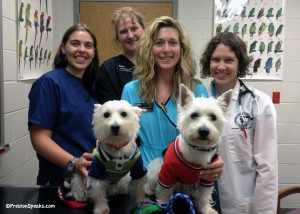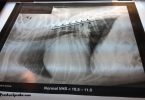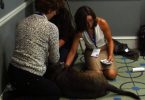Last month, Elvis and I road tripped it up to West Layette, Indiana to visit the Purdue University Comparative Oncology Program at their college of veterinary medicine. Dogs fear the C word (cancer) as much as you humans do, and when I heard they wanted healthy westies to be a part of their research study, Elvis and I both raised our paws to volunteer.
Purdue is studying dog Urinary Bladder Cancer (Transitional Cell Carcinoma – TCC). In humans with this type of cancer, the tumors that are in the bladder lining are usually low grade while in dogs it is usually mid to high grade. While only 2% of all dogs that get cancer have this type, that is still 140,000 dogs a year! Also, if they can find a way to treat or even cure canine TCC, then they can hopefully use the same treatment options in humans.
It isn’t known what causes this cancer in canines. Doctors say it could be environmental or genetic. In humans it is known that smoking increase the risk. In canines, it is known that there are breeds that are high-risk for this type of cancer including: Scotties, Westies, Wire Hair Fox Terriers, and Beagles. West Highland White Terriers are three to five times more likely to have TCC than other breeds. That is scary! Even more scary is that Scotties are twenty times more likely to have bladder cancer.
There are some warning signs of Transitional Cell Carcinoma that our humans need to watch for including blood in our urine and if we are straining to go potty. However, don’t let them freak out if you have these signs. These are also common symptoms of a doggie Urinary Tract Infection (UTI). However, if your vet suspects TCC, they can do ultrasounds, urine tests, and tissue biopsies. If it turns out a dog does have cancer, treatment options include surgery, radiation, chemotherapy, and other types of medication. The average survival time is 250-300 days – less than one year. This is why it is so important we help these great vets find risk factors and treatment options for our pals.
According to Dr. Deborah Knapp, the director of the Comparative Oncology program, they have found a couple factors that increase our risk of having the big C. The first one is, don’t let your rents use the old generation flea dips on you. Second, walking on chemically treated lawns also increase our chances. Unfortunately, they haven’t determined exactly what chemical in the lawn treatment is bad yet. On a positive note, one thing they have found that lowers our chances of getting cancer is to feed us carrots three times a week.
When Elvis and I arrived at Purdue we were crossing our paws. They needed us to have a full bladder to do the tests! Lucky for us, our new pal Sarah Lahrman met us in the parking lot and took us right in for our tests. First, they did an ultrasound of our bladders to see if anything looked weird. Then, they let us go potty and they collected several samples of our urine. They will be looking at the urine and doing many test on it for their research. Finally, they took a blood sample. The blood is going to another vet school to another research program. That group is trying to narrow down any genetic causes of TCC.
It turned out that participating in the trial wasn’t very difficult and we got to eat several treats too. All the wonderful people at the Comparative Oncology program made over us and we got plenty of petting and attention. We also met another really cool vet named Dr. Diana Schrempp who is a big westie fan and she took really good care of us too.
In case you ever consider participating in a research trial, let me give you one piece of advice … let your vet know ahead of time! We didn’t do that because we didn’t think it was a big deal and wound up giving our vets a scare. What happened is that our vet’s office received a fax from Purdue saying I was accepted into their Oncology program. They automatically assumed the worst and thought I had cancer. They got ahold of Mom right away to see what was going on since I was just in there a few months ago. We got it all cleared up right away. Once they knew I wasn’t sick, they thought it was really neat that we helped out.
So my pals, if you ever have an opportunity to participate in a research trial at your local school of veterinary medicine, don’t hesitate to sign up. You are helping us dogs all over the world. To learn more about the great program at Purdue, please go to: http://www.vet.purdue.edu/pcop/index.php










Thank you for doing this! We lost our Freddie (Westie) to bladder cancer exactly 3 years ago and we miss her every day. (Yes Freddie was a she – and what a character!) We have our rescue Westie – Charlie Dickens and he’s another whole character himself but that empty spot is still there.
But thank you!!
Maryanne & Bob & Charlie
I think that’s great that you’re participating in this study, Preston…as your mom knows, we lost our Tigger to TCC and she was only 8 1/2. There was a study then and we sent blood from both Tigs and Pooh Bear.
The one caution we’d make, per our veterinary oncologist, is to avoid needle biopsies or other invasive tests. Dr. Harris believes it can “seed the tumor”. Just something to think about. Also, bladder tumors are often not visible through x-rays…ultrasound is the way to go.
Thanks again for participating in this important study!
[…] Last month, Elvis and I road tripped it up to West Layette, Indiana to visit the Purdue University Comparative Oncology Program at their college of… […]